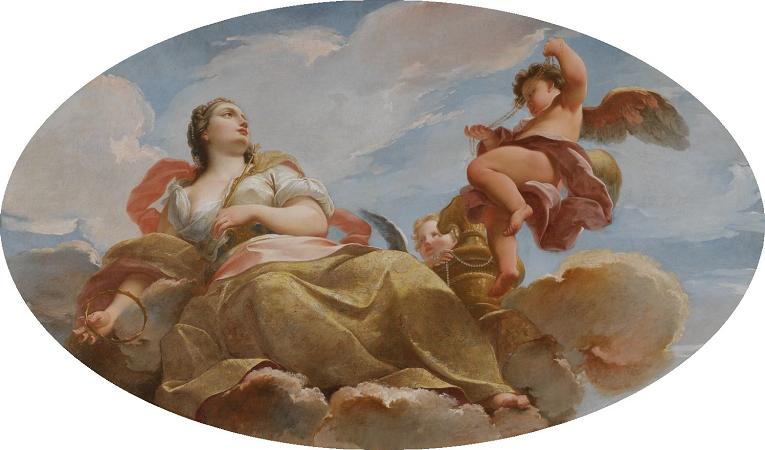Fortune. Fortuna was the goddess of fortune and the personification of luck in Roman religion who, largely thanks to the Late Antique author Boethius, remained popular through the Middle Ages until at least the Renaissance. Fortuna is often depicted with a gubernaculum, a ball or Rota Fortunae and a cornucopia. She might bring good or bad luck: she could be represented as veiled and blind, as in modern depictions of Lady Justice, except that Fortuna does not hold a balance. Fortuna came to represent life's capriciousness. She was also a goddess of fate: as Atrox Fortuna, she claimed the young lives of the princeps Augustus' grandsons Gaius and Lucius, prospective heirs to the Empire. Fortuna's father was said to be Jupiter and like him, she could also be bountiful. As Annonaria she protected grain supplies. June 11 was consecrated to her: on June 24 she was given cult at the festival of Fors Fortuna. Fortuna's name seems to derive from Vortumna. Roman writers disagreed whether her cult was introduced to Rome by Servius Tullius or Ancus Marcius. The two earliest temples mentioned in Roman Calendars were outside the city, on the right bank of the Tiber. The first temple dedicated to Fortuna was attributed to the Etruscan Servius Tullius, while the second is known to have been built in 293 BC as the fulfilment of a Roman promise made during later Etruscan wars. The date of dedication of her temples was 24 June, or Midsummer's Day, when celebrants from Rome annually floated to the temples downstream from the city. After undisclosed rituals they then rowed back, garlanded and inebriated. Also Fortuna had a temple at the Forum Boarium. Here Fortuna was twinned with the cult of Mater Matuta, and the paired temples have been revealed in the excavation beside the church of Sant'Omobono: the cults are indeed archaic in date. Fortuna Primigenia of Praeneste was adopted by Romans at the end of 3rd century BC in an important cult of Fortuna Publica Populi Romani on the Quirinalis outside the Porta Collina. No temple at Rome, however, rivalled the magnificence of the Praenestine sanctuary. Fortuna's identity as personification of chance events was closely tied to virtus. Public officials who lacked virtues invited ill-fortune on themselves and Rome: Sallust uses the infamous Catiline as illustration-Truly, when in the place of work, idleness, in place of the spirit of measure and equity, caprice and pride invade, fortune is changed just as with morality. An oracle at the Temple of Fortuna Primigena in Praeneste used a form of divination in which a small boy picked out one of various futures that were written on oak rods. Cults to Fortuna in her many forms are attested throughout the Roman world. Dedications have been found to Fortuna Dubia, Fortuna Brevis and Fortuna Mala. Fortuna is found in a variety of domestic and personal contexts. During the early Empire, an amulet from the House of Menander in Pompeii links her to the Egyptian goddess Isis, as Isis-Fortuna. She is functionally related to the god Bonus Eventus, who is often represented as her counterpart: both appear on amulets and intaglio engraved gems across the Roman world. In the context of the early republican period account of Coriolanus, in around 488 BC the Roman senate dedicated a temple to Fortuna on account of the services of the matrons of Rome in saving the city from destruction. Evidence of Fortuna worship has been found as far north as Castlecary, Scotland and an altar and statue can now be viewed at the Hunterian Museum in Glasgow. The earliest reference to the Wheel of Fortune, emblematic of the endless changes in life between prosperity and disaster, is from 55 BC. In Seneca's tragedy Agamemnon, a chorus addresses Fortuna in terms that would remain almost proverbial, and in a high heroic ranting mode that Renaissance writers would emulate: O Fortune, who dost bestow the throne's high boon with mocking hand, in dangerous and doubtful state thou settest the too exalted. Never have sceptres obtained calm peace or certain tenure; care on care weighs them down, and ever do fresh storms vex their souls. Great kingdoms sink of their own weight, and Fortune gives way neath the burden of herself. Sails swollen with favouring breezes fear blasts too strongly theirs; the tower which rears its head to the very clouds is beaten by rainy Auster.
more...









